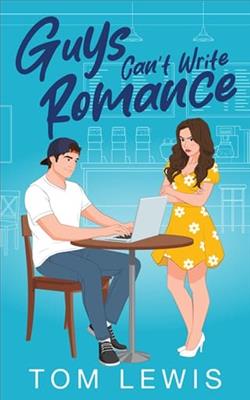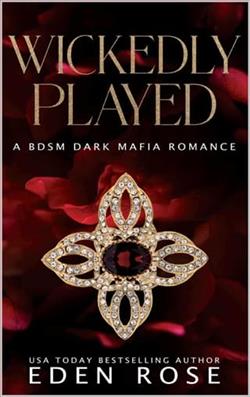Page 78 of The Christmas Keepsake
The Pink Bootie Ornament
The Pink Bootie Ornament is number 13. When you open the box, you’ll see the impossibly tiny little baby sock. The little foot that wore it grew too big. The baby learned to walk and boy, did she go far. But before her little feet walked, I held them. I tickled them and adored every toe, all ten. You may think you know whose feet I’m talking about, but I think you’ll be surprised.
Here’s the story behind The Pink Bootie Ornament.
My daughter, your mother, Daisy, was a spitfire. You should have seen her, barely tall enough to peek over the edge of the stage, eyes wide with wonder as she watched the actors rehearse. She’d toddle around backstage, trailing ribbons and sparkles in her wake, a tiny whirlwind of creativity and joy.
As years went on, things changed, though, as they tend to do. Daisy grew older, and that spark I’d seen in her eyes began to dim. Gradual at first. So subtle that I didn’t see it happening. But then, one day, I turned around and found a stranger standing where my little girl used to be.
I tried to help her, to bridge that growing chasm between us. I’d ask about her day, try to engage her in conversations about the things she liked. But it was like trying to catch smoke with my bare hands. The more I reached out, the further I felt her slipping away.
We just didn’t have much in common anymore. Where I saw magic in the swish of a curtain or the hush of an anticipating audience, Daisy longed to be on a screen—small or big. It didn’t matter. She didn’t see the point of theater, which was captured in the moment but gone after the last bow. She begged me to drive her to theclosest auditions, which were hours away. My schedule didn’t allow for that.
“I’ll live with Aunt Mauve then,” Daisy had said. As you know, Mauve is my sister, at the time, a single woman who lived in Boston. “Aunt Mauve has already said I could.”
That fact felt like a betrayal.
“I’m your mother.”
“Then let me be happy.”
I said no, of course. Over and over. Then one day, I came home, and Daisy was gone. I was frantic, imagining all sorts of terrible scenarios. But Daisy came back after a day, sullen and not at all apologetic. After that, it became a pattern. She’d disappear for a day or two and then return as if nothing had happened.
Then came the Christmas when she was sixteen years old. It was the night of the big show,Santa, Baby.I was backstage, fussing over costumes and last-minute changes when Mickey told me Daisy was gone. Not just gone to a friend’s house or the mall. Really gone.
For the first time in Bloom’s history, that year the Christmas play didn’t go on. Not that night, at least. I canceled the show, much to everyone’s disappointment. But how could I stand on that stage, spouting lines about joy and family when my own child was out there somewhere, alone?
We found her a week later, holed up in a run-down motel two towns over. She’d been hitching rides, trying to get to Mauve’s home in Boston. Daisy was cold, hungry, and more angry than I’d ever seen her. When I told her about the canceled play, she flew into a rage.
“See?” she screamed. “Your precious show is moreimportant than me! You only came looking because you had to cancel it!”
“That’s not true, Daisy. I canceled the play because I love you more. You mean more to me than the entire world. And without you, the show doesn’t go on. It can’t.”
“If you love me, let me live with Aunt Mauve. Let me chase my dream. Don’t punish me because you never lived yours.”
It felt like a slap in my face.
“I’m not going back with you,” Daisy said.
“You’d rather be here? Cold and hungry?”
Daisy lifted her chin, her eyes flashing a million feelings. In a way, I saw myself in her. The me that had gone off to New York, chasing things that I thought were bigger and brighter. And better. I never would have found my true happiness had I not gone off and realized it was all a lie. The grass was not greener on the other side. “Yes. And if you force me to go back with you, I’ll just leave again the first chance I get.”
I knew she was telling the truth. She’d leave. This cycle would continue. I had to let her go and pray she’d return the way I did to my family.
“Okay. I’ll drive you to Mauve’s.” At least Daisy wouldn’t be living on the streets or at the mercy of whoever gave her a ride.
So I took her to my sister’s, making sure Daisy knew my door would always be open to her. Then I returned to Bloom, and the Christmas play went on the following week. The town was understanding, rallying around us with a spirit of unity I’ll never forget. Christmas wasn’t the same without my daughter though. My joy was gone. My heart was broken.
The new year came and went, and I prayed for my Daisy all day every day. Bring her home. Bring my Daisy home. Then one day, a year later, my prayer was answered. Standing on my porch like a vision, looking older, tired… and carrying a bundle in her arms. For a moment, I thought I was dreaming. But then the pink bundle moved, and I heard the unmistakable cry of a baby.
A warmth spread through my chest.
My granddaughter. Oh, she was the tiniest, most perfect thing I’d ever seen, dressed in a little onesie with the teeniest booties on her tiny feet. In that moment, looking at Daisy’s uncertain face and that precious baby, I knew that everything was going to be all right.
“Aunt Mauve didn’t know,” she said, almost as if hearing my unspoken question. “She doesn’t really pay attention to me.”
This didn’t surprise me. Mauve was a workaholic. She’d agreed to have Daisy stay with her, but I was under no illusion that she was filling the role of Daisy’s mother.















